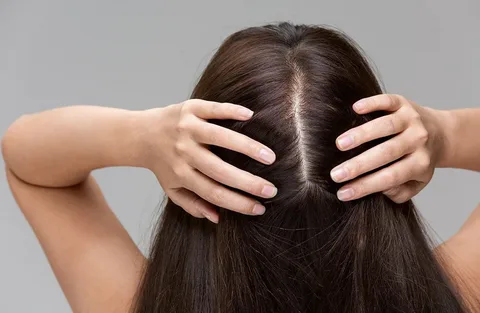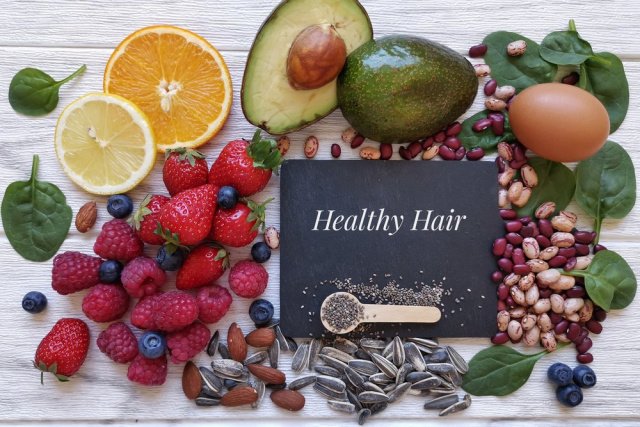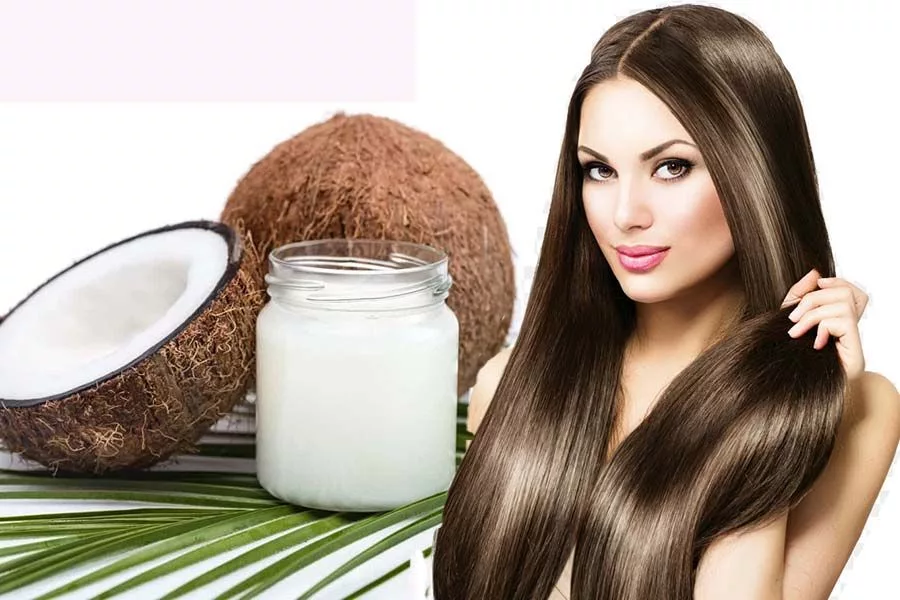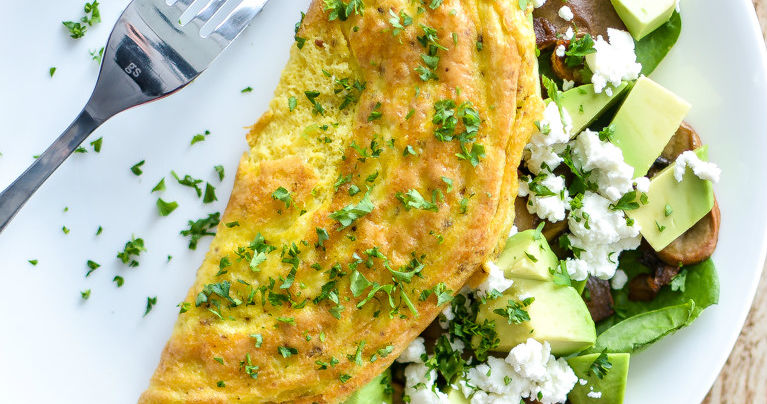Healthy hair is often a reflection of a healthy body, and one of the most effective ways to nourish your hair is through proper nutrition. While hair care products can certainly help maintain shine and manageability, the foundation of strong, vibrant hair starts from within.
The right foods, rich in essential vitamins, minerals, and healthy fats, play a crucial role in promoting hair growth, strength, and overall health. In this article, we will explore some of the best foods for healthy hair that provide the nutrients your hair needs to thrive.
Your hair tells a story about your health, and what’s on your plate plays a starring role. Let’s explore the science backed foods that’ll transform your locks from lifeless to luxurious.
Understanding Hair Structure & Growth
Think of your hair like a garden it needs the right nutrients to flourish. Each strand goes through three key phases: growth (anagen), transition (catagen), and rest (telogen).
What you eat today shows up in your hair about 2-3 months later.
Did you know? Your hair grows about 0.5 inches (1.25 cm) per month, and you have roughly 100,000 hair follicles on your scalp.
“You are what you eat, and so is your hair.” Dr. Sarah Mitchell, Trichologist
Essential Proteins: The Building Blocks
Your hair is 95% protein (keratin), so let’s start with the foundation. Here’s what you need:
Complete Protein Sources
- Eggs: Nature’s perfect hair food
- 6g protein per egg
- Rich in biotin
- Contains sulfur (key for keratin)
- Fish:
- Salmon (21g protein per 3oz)
- Mackerel (20g protein per 3oz)
- Sardines (18g protein per 3oz)
Plant Based Protein Heroes
- Quinoa: 8g protein per cup
- Chickpeas: 15g protein per cup
- Lentils: 18g protein per cup
Pro Tip: Combine plant proteins for complete amino acid profiles.
Critical Vitamins & Their Food Sources
Biotin (B7) Superstars
- Dark leafy greens
- Spinach
- Kale
- Swiss chard
- Sweet potatoes (rich in beta carotene too)
- Mushrooms (especially cremini)
| Vitamin | Top Sources | Benefits for Hair |
| D | Fatty fish, eggs, sunlight | Creates new follicles |
| E | Almonds, sunflower seeds | Protects from oxidative stress |
| C | Bell peppers, citrus | Supports collagen production |
Mineral Rich Foods for Strong Strands
Iron Champions
- Grass fed beef
- Oysters
- Spinach + Vitamin C foods for better absorption
Case Study: A 2013 study in the Journal of Korean Medical Science found that women with iron deficiency had significantly higher rates of hair loss.
Zinc & Selenium Powerhouses
- Pumpkin seeds (zinc)
- Brazil nuts (selenium)
- Oysters (both!)
Hydrating Foods for Healthy Scalp and Hair
Maintaining healthy, vibrant hair goes beyond just topical treatments and shampoos. A hydrated scalp and hair are essential for growth, shine, and overall health. Dehydration can lead to dry, brittle hair, a flaky scalp, and even hair loss.
While drinking enough water is crucial, the foods you eat also play a significant role in keeping your hair hydrated from the inside out. Let’s explore some of the best hydrating foods that can promote a healthy scalp and nourished hair.
1. Cucumbers: A Refreshing Source of Hydration
Cucumbers are made up of around 95% water, making them one of the most hydrating foods you can eat. This high water content helps to keep both your scalp and hair moisturized, preventing dryness and flakiness.
In addition to hydration, cucumbers are rich in silica, a compound that promotes healthy hair growth and strengthens the strands. Incorporating cucumbers into your diet, whether in salads or smoothies, is a simple yet effective way to hydrate your hair.
2. Watermelon: The Juicy Hair Booster
Watermelon is another hydrating powerhouse, with a water content of about 92%. This juicy fruit is loaded with vitamins A and C, both of which are essential for maintaining a healthy scalp. Vitamin A helps in the production of sebum, the natural oil produced by the scalp to keep hair moisturized.
Vitamin C, on the other hand, is a potent antioxidant that helps protect hair from damage caused by free radicals. Eating watermelon regularly can keep your hair hydrated and your scalp nourished, reducing the risk of dryness or irritation.
3. Avocados: Rich in Healthy Fats
Avocados are a fantastic source of healthy fats, particularly monounsaturated fats, which are essential for keeping both your scalp and hair hydrated. These fats help to lock in moisture, preventing hair from becoming dry or frizzy.
Additionally, avocados are rich in vitamins E and B, which improve blood circulation to the scalp, promoting better hair growth and overall hair health. You can enjoy avocados in salads, as a spread on toast, or even in smoothies for a nourishing boost to your hair.
4. Coconut Water: Natural Hydration for Your Hair
Coconut water is a natural and excellent hydrating beverage that is packed with electrolytes and minerals like potassium, magnesium, and calcium. These minerals not only hydrate your body but also help maintain moisture levels in your hair and scalp.
Coconut water can also balance the pH levels of your scalp, reducing dryness and flakiness. Drinking coconut water regularly or using it as a hydrating toner for your scalp can improve moisture retention and support healthy hair growth.
5. Leafy Greens: Packed with Nutrients for Healthy Hair
Leafy greens like spinach, kale, and Swiss chard are high in water content, while also being rich in vitamins and minerals that promote hair hydration. They are loaded with vitamins A, C, and K, as well as iron and folate, which are crucial for healthy hair follicles.
These greens also provide antioxidants that help to protect the scalp from oxidative stress, a key factor in hair thinning and hair loss. Including a variety of leafy greens in your diet ensures your hair stays nourished and moisturized from the inside out.
6. Yogurt: A Hydrating and Protein Rich Option
Yogurt is not only a great source of hydration but also contains protein, which is essential for hair strength. The probiotics in yogurt can also help maintain a healthy scalp by balancing the scalp’s microbiome, preventing dryness, itchiness, and dandruff.
The moisture and nutrients found in yogurt help replenish the scalp’s hydration and contribute to healthier, shinier hair. Adding yogurt to smoothies, parfaits, or as a snack can give your hair a boost of both hydration and nourishment.
Healthy Fats That Feed Your Follicles
Your scalp loves these fats:
- Omega-3s:
- Wild salmon
- Mackerel
- Sardines
- Flaxseeds
- Monounsaturated Fats:
- Avocados
- Olive oil
- Almonds
The Mediterranean Diet Connection
Research shows Mediterranean diet followers have better hair health. Here’s why:
- High in fresh vegetables
- Rich in healthy oils
- Abundant in whole grains
- Limited processed foods
Sample Mediterranean Day:
- Breakfast: Greek yogurt with walnuts
- Lunch: Quinoa bowl with sardines
- Dinner: Grilled fish with roasted vegetables
Foods to Limit or Avoid
Your hair’s enemies:
- Added sugars
- Processed foods
- Excessive alcohol
- High mercury fish
Meal Planning for Maximum Benefits
Power Breakfast Ideas:
- Spinach omelet with avocado
- Greek yogurt parfait with berries
- Smoothie bowl with chia seeds
Nutrient Packed Smoothie Recipe:
- 1 cup spinach
- 1 banana
- 1 tbsp flaxseeds
- 1 cup almond milk
- 1 tbsp pumpkin seeds
- Optional: protein powder
Special Considerations
Seasonal Eating for Hair Health
- Spring: Fresh greens
- Summer: Berries
- Fall: Pumpkin seeds
- Winter: Root vegetables
Age Related Changes
- 30s: Increase protein intake
- 40s: Focus on antioxidants
- 50+: Boost collagen support
FAQs About Hair Healthy Foods
Q: Can drinking green tea improve hair growth? A: Yes, green tea contains EGCG, which promotes hair growth and prevents hair loss.
Q: How much protein do I need daily for healthy hair? A: Aim for 0.8-1g of protein per kg of body weight for optimal hair health.
Q: Will biotin supplements work better than food sources? A: Food sources are generally better absorbed and come with additional nutrients.
Q: Can a vegan diet support healthy hair growth? A: Yes, with proper planning to include all essential nutrients, especially B12 and iron.
Q: How long until I see results from dietary changes? A: Typically 2-3 months, as this is the hair growth cycle length.
Conclusion
Incorporating nutrient rich foods into your diet is one of the most natural and effective ways to support your hair health. By focusing on foods high in vitamins, minerals, and healthy fats, you can give your hair the nourishment it needs to grow stronger, shinier, and more resilient.
Remember, healthy hair is a reflection of overall well being, so a balanced diet not only helps your hair but also contributes to your overall vitality. Embrace these hair boosting foods for a more radiant and vibrant mane.
Remember: Consistency is key. Your hair needs constant nourishment, not quick fixes.
“The health of your hair is 25% genetics and 75% what you feed it.” Dr. James Thompson, Nutritionist
By following these guidelines and incorporating these nutrient rich foods into your daily diet, you’ll be giving your hair the building blocks it needs to grow strong, shiny, and healthy. Remember, beautiful hair starts from within, and your plate is your most powerful tool for achieving the locks you’ve always wanted.



